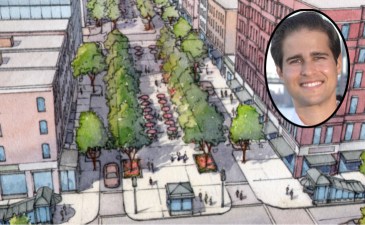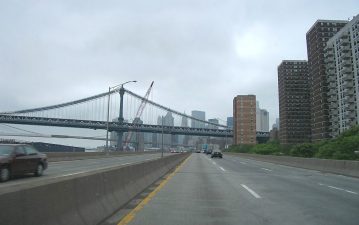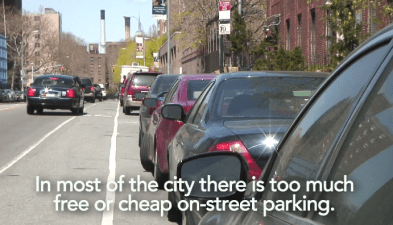Upper East Side Candidate Moscaritolo Wants Residential Parking Permits
A controversial plank in an otherwise straight-ahead transportation platform.

This is the latest installment in our ongoing coverage of the council race on the Upper East Side of Manhattan. Previous stories included one on Billy Freeland’s transportation plan, an op-ed on the need for accessibility in transit by Rebecca Lamorte and coverage of Julie Menin’s transportation plan.
Emmy Award-winning-journalist-turned-activist Kim Moscaritolo, one of seven candidates running for the seat on the City Council representing the Upper East Side, has a deeply controversial plank in her transportation plan, “Equitable Transportation, Thriving City”: residential parking permits.
“Permitted parking, which other cities such as Boston, Los Angeles, and Chicago have implemented, reduces or eliminates nonresidents’ ability to park in certain residential neighborhoods. It would require residents to register their cars in-state, and could raise much-needed revenue for the city, in addition to freeing up space on our streets to reduce congestion,” the plan states.

To Moscaritolo, the measure is a necessity for the Upper East Side as congestion pricing looms.
“Residential parking permits will help prevent drivers from coming into Manhattan and parking just outside the congestion zone, which ends at 60th Street,” she told Streetsblog. “I believe a residential parking permit program has the opportunity to be very popular in District 5, as many local voters have voiced their discontent with street congestion, which contributes to noise, air pollution, and traffic slowdowns. Residential parking permits — along with dedicated loading zones, busways, and protected bike lanes — will prioritize our local community, and get cars off the street. Ultimately, I believe our streets should be for people, not for cars.”
The benefits of such a program are debatable. Several City Council members with districts close to the Central Business District — where congestion pricing is to be implemented in what its proponents hope is the not-too-distant future — have pushed for such a measure over the years, and community boards on the West Side have debated it. (Mayor Bloomberg recommended residential parking permits in his initial 2007 proposal for congestion pricing.)
But some analysts suggest that such a program could encourage more residents to buy cars, even though they would only have a “hunting license” to look for spots. Moreover, studies of residential parking permit programs in Boston and Chicago show that they are hard to price fairly and encourage many carve-outs, such as for low-income people and those with disabilities, that tend to undercut the program’s goals of reducing congestion and car use.
A report on residential parking permit programs by the Office of Manhattan Borough President Gale Brewer, points up some pitfalls for New Yorkers, whose parking spaces represent some of the world’s most valuable real estate: “Low, flat-fees do more harm than good by incentivizing further vehicle ownership,” Brewers report says. The report also notes that such programs can create inequities within neighborhoods, because a “permit cap in each neighborhood often leads to waiting lists and deciding who receives a higher place on the waiting list is a difficult process and something most cities would prefer to avoid.”

“My plan includes common-sense changes to our city’s transportation infrastructure that can be implemented rapidly to get New York City back on its feet as we recover from the COVID-19 pandemic and look forward to a changing climate landscape,” she said. “In addition to building better infrastructure to accommodate more cyclists and pedestrians on streets, and investing in public transportation — particularly in communities that have historically lacked public transportation investments — I focus heavily on oversight and accountability. We need proper oversight to implement the policy changes to ensure our transportation works for everyone: safe and reliable for pedestrians, cyclists, motorists, and public transportation users alike.”
Moscaritolo’s plan basically calls for the extension (or resumption) of stalled de Blasio policies, including:
- Getting the “Green Wave” bike-safety plan back on track, with investments in more protected bike lanes, bicycle infrastructure in 10 Bicycle Priority Districts
- Prioritizing pedestrian and bicycle infrastructure on the city’s bridges, as adumbrated in Transportation Alternatives’s “Bridges for People” campaign
- Expanding the Open Streets initiative
- Create more dedicated busways, like the one on 14th Street, which bans most cars, taxis, and vans from selected sections of road in order to improve access for buses, trucks and first responders
- Electrifying the bus fleet, especially bus routes through areas that historically have suffered heavy air pollution, and committing to electrifying all city vehicles, particularly school buses
- Incentivizing businesses to receive deliveries during off-hours to avoid delivery trucks double parking and blocking lanes
- Creating dedicated loading zones for freight delivery.
It also makes the obligatory nod to “immediate investments into our public transportation system.”
Moscaritolo, who is currently a Democratic district leader, has been endorsed by State Sens. Liz Krueger, José Serrano, and Jessica Ramos; Assembly Member Rebecca Seawright; and Zephyr Teachout.
The district is now represented by the term-limited Ben Kallos, who is running for borough president.




